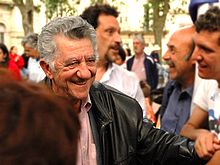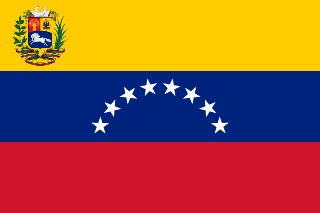
Cuba's foreign policy has been fluid throughout history depending on world events and other variables, including relations with the United States. Without massive Soviet subsidies and its primary trading partner, Cuba became increasingly isolated in the late 1980s and early 1990s after the fall of the USSR and the end of the Cold War, but Cuba opened up more with the rest of the world again starting in the late 1990s when they have since entered bilateral co-operation with several South American countries, most notably Venezuela and Bolivia beginning in the late 1990s, especially after the Venezuela election of Hugo Chávez in 1999, who became a staunch ally of Castro's Cuba. The United States used to stick to a policy of isolating Cuba until December 2014, when Barack Obama announced a new policy of diplomatic and economic engagement. The European Union accuses Cuba of "continuing flagrant violation of human rights and fundamental freedoms". Cuba has developed a growing relationship with the People's Republic of China and Russia. In all, Cuba continues to have formal relations with 160 nations, and provided civilian assistance workers – principally medical – in more than 20 nations. More than one million exiles have escaped to foreign countries. Cuba's present foreign minister is Bruno Rodríguez Parrilla.

The Andean Community is a free trade area with the objective of creating a customs union comprising the South American countries of Bolivia, Colombia, Ecuador, and Peru. The trade bloc was called the Andean Pact until 1996 and came into existence when the Cartagena Agreement was signed in 1969. Its headquarters are in Lima, Peru.

The Union of South American Nations is an intergovernmental regional organization that once comprised twelve South American countries; as of 2019, most have withdrawn.
Telesur is a Latin American terrestrial and satellite television network headquartered in Caracas, Venezuela and sponsored primarily by the government of Venezuela, with additional funding from the governments of Cuba, Nicaragua, Uruguay, and Bolivia. It was launched in 2005, under the government of Hugo Chavez, with the aim of being "a Latin socialist answer to CNN".

The Broad Front is a Uruguayan centre-left to left-wing coalition of political parties. Frente Amplio has close ties with PIT-CNT trade union and the cooperative housing movement. It has been the governing party of Uruguay since 2005; Presidents Tabaré Vázquez and José Mujica are members of the party.
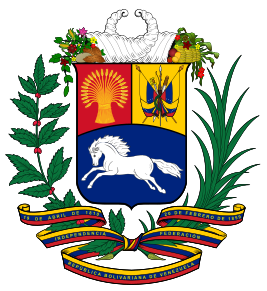
The foreign policy of the Hugo Chávez administration concerns the policy initiatives made by Venezuela under its former President, Hugo Chávez, towards other states. Chávez's foreign policy may be roughly divided into that concerned with United States-Venezuela relations and that concerned with Venezuela's relations with other states, particularly those in Latin America and developing countries on other continents. In many respects the policies of the Chávez government were a substantial break from the previous administrations that governed Venezuela.
The pulp mill dispute was a dispute between Argentina and Uruguay concerning the construction of pulp mills on the Uruguay River. The presidents at the time were Néstor Kirchner (Argentina) and Tabaré Vázquez (Uruguay). As a diplomatic, economic, and public relations conflict between both parties, the dispute also affected tourism and transportation as well as the otherwise amicable relations between the two countries. The feud was unprecedented between the two countries, which have shared historical and cultural ties. Proceedings were brought before the International Court of Justice as a case formally named Pulp Mills on the River Uruguay (Argentina v. Uruguay). It ruled that, although Uruguay failed to inform Argentina of the operations, it did not pollute the river, so closing the pulp mill would be unjustified. The conflict ended in 2010, during the presidencies of Cristina Fernández de Kirchner (Argentina) and José Mujica (Uruguay), with the establishment of a joint coordination of the activities in the river.
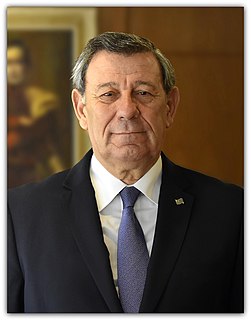
Rodolfo Nin Novoa is a Uruguayan politician who is the Chancellor of Uruguay, he was formerly the Vice President of Uruguay from 2005 to 2010. He is the leader of Progressive Alliance.
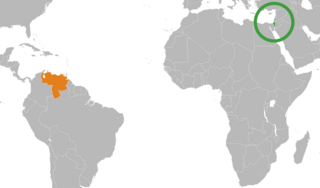
Israeli–Venezuelan relations refer to foreign relations between Israel and Venezuela.

Latin America–United States relations are relations between the United States of America and the countries of Latin America. Historically speaking, bilateral relations between the United States and the various countries of Latin America have been multifaceted and complex, at times defined by strong regional cooperation and at others filled with economic and political tension and rivalry. Although relations between the U.S. government and most of Latin America were limited prior to the late 1800s, for most of the past century, the United States has unofficially regarded parts of Latin America as within its sphere of influence, and for much of the Cold War (1947–1991), actively vied with the Soviet Union for influence in the Western Hemisphere.

United States–Uruguay relations are the bilateral relations between the United States of America and the Eastern Republic of Uruguay. Relations traditionally have been based on a common outlook and emphasis on democratic ideals.
Gonzalo Daniel Fernández Domínguez is a Uruguayan politician and former Foreign Minister of Uruguay, having been appointed in March 2008. Subsequently he was Defense Minister until March 1, 2010.
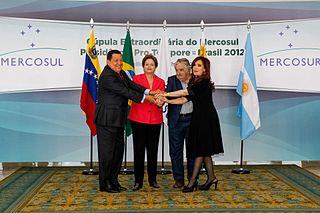
"Pink tide" and "turn to the left" are phrases used in contemporary 21st-century political analysis in the media and elsewhere to describe the revolutionary wave and perception of a turn towards left-wing governments in Latin American democracies straying away from the neoliberal economic model. The shift represented a move toward more progressive economic policies and coincides with a parallel trend of democratization of Latin America following decades of inequality.

Daisy Tourné is a Uruguayan politician.
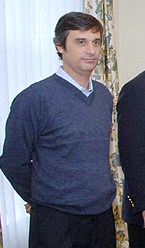
Álvaro García Rodríguez is a Uruguayan politician.
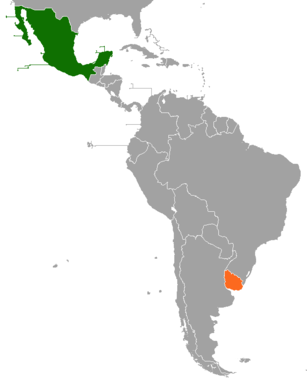
Mexico–Uruguay relations are foreign relations between Mexico and Uruguay. Both nations are members of the Latin American Integration Association, Organization of American States, Organization of Ibero-American States and the Rio Group.

Raúl Fernando Sendic Rodríguez is a Uruguayan politician. He was the Vice President of Uruguay from 1 March 2015 to 13 September 2017.
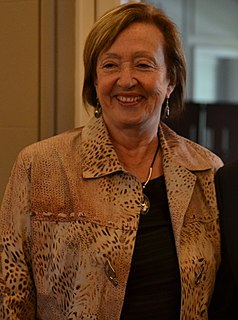
María Julia Muñoz is a Uruguayan doctor in medicine and politician. Formerly a Uruguayan Minister for Public Health, she is now a Minister of Education and Culture for Uruguay, as of March 1, 2015.

The International Conference on the Situation in Venezuela was a meeting of states which occurred in Montevideo, Uruguay, on 7 February 2019 to address the 2019 Venezuelan presidential crisis about the legitimacy of claims to the Venezuelan presidency by Juan Guaidó and Nicolás Maduro. The conference was jointly sponsored by the governments of Mexico and Uruguay; other participating countries included Bolivia, Costa Rica, Ecuador, France, Germany, Italy, the Netherlands, Portugal, Spain, Sweden, and the United Kingdom, forming the International Contact Group on Venezuela.
